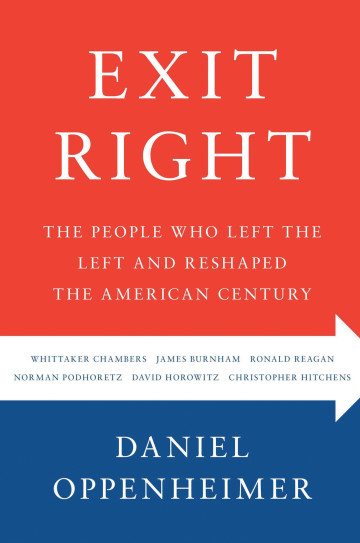
Turning Hard Right
Daniel Oppenheimer's 'Exit Right' looks at why some of the left's brightest lights gave up the cause.

A version of this story ran in the March 2016 issue.
We live in an era in which partisan affiliation can seem, at times, to be as hard-wired into our identities as height or hair color. Republicans and Democrats are more ideologically distinct than at any point in recent history, and that has had huge consequences, from the machinations of Congress all the way down to how Americans relate on an interpersonal level. We self-sort into communities that share our ideologies — from the careers we choose to the places we live to the friends we keep.
Americans increasingly have little to do with people who think differently. In 2014, the Pew Research Center found that more than one-third of self-identified Republicans felt the Democratic Party was not just wrong but also a threat to the country’s well-being. More than a quarter of Democrats felt similarly about the opposition. This state of affairs has come to feel normal, but of course it is not. Through much of the 20th century and, indeed, until fairly recently, the ideological landscape of the country was constantly shifting, as coalitions formed and changed and political parties morphed to accommodate them.
Enter Exit Right: The People Who Left the Left and Reshaped the American Century, authored by Daniel Oppenheimer, a director of strategic communications at the University of Texas at Austin. Exit Right takes the form of six biographical accounts, presented in chronological order, of prominent apostates of the American left: Whittaker Chambers, James Burnham, Ronald Reagan, Norman Podhoretz, David Horowitz and Christopher Hitchens.
An astonishing amount of material has been written by these men, even more about them. So Oppenheimer’s challenge is to boil down these men — their work and their ideological shifts — to their essences, in about 60 pages each. Oppenheimer’s focus is squarely on their values and the personal truths that “precede politics,” as he puts it in Chambers’ case. These are psychological profiles, stories of neuroses, failings, traumas and personal oddities that colored the way the men perceived the world around them.
Exit Right excels as a portrait of minds in tension — the psychological roiling of highly intelligent people who struggled to negotiate a changing world, sometimes failing and sometimes succeeding. In the book’s introduction, Oppenheimer poses the question: Are we defined by our convictions or our doubts? Each man he profiles enters political consciousness with a very particular framework for understanding the world, influenced by childhood experiences, friendships and education. These frameworks can be hard-won, as in Chambers’ case, or casually acquired, as in Reagan’s. But each man’s political beliefs contain loose threads. Eventually, life’s changing circumstances pull one of these threads and the framework inverts — often in a seemingly shocking and sudden way. But in each case, there is much continuity as well as change.
The book is also an engaging history of the American left framed in an unusual way. It starts with Chambers and a vivid account of the cloistered world of the pro-Soviet left in New York City in the years after the Russian Revolution, and ends with Hitchens’ death in 2011. In between, all six men rise as leftist intellectuals or activists, try to respond to the failings of the previous generation, and fail, in turn, to make the mark they hoped to make on the broader political culture. In providing a single narrative connecting these periods, Oppenheimer takes now-obscure American political history and makes it compelling for a general audience.
Oppenheimer is an entertaining and thoughtful writer, and he displays a keen eye for detail in assembling the six narratives, despite their relative brevity. From his account of Chambers’ lonely, painful early life as the child of rootless Bohemians in the buttoned-down town of Lynbrook, Long Island, in the 1910s, we learn, for example, that he was obliged to perform for the neighbors as a “nearly nude, gauze-draped cherub” in his parents’ production of The Rubaiyat of Omar Khayyam.

by Daniel Oppenheimer
SIMON & SCHUSTER
416 PAGES; $28 (hardcover)
So, too, are we told that Reagan, upon his first real success in Hollywood, hired his father, with whom he had a troubled relationship, to answer his fan mail, highlighting a deep need for approval. And Podhoretz’s painful encounters with Allen Ginsberg and Jack Kerouac, as well as his humiliating dressing-down by the New York intelligentsia after the release of his book Making It, are evocatively recounted.
Exit Right brings a unique and compelling focus to its subjects, but it’s more useful the less you know about the men, simply because of the limited depth allowed by the length and format. As for the subtitle, the book tells the story of men who “left the left,” but not how they “reshaped the American century;” generally Oppenheimer writes about his subjects’ lives only up until the moment of their ideological conversion. Is it really true that Norman Podhoretz and David Horowitz altered America’s course? Or will they be seen, in years to come, simply as historical oddities? It’s hard to say, and Oppenheimer doesn’t provide a convincing answer.
The more familiar you are with Oppenheimer’s subjects, the more you may find yourself questioning his arrangement of psychological and biographical factors as the primary reason for these ideological shifts. For example, does Hitchens’ post-9/11 shift to neoconservatism really stem from a latent admiration for empire connected to his distant and incomplete relationship with his father, who served in the Royal Navy? In Oppenheimer’s telling, Hitchens’ sudden desire for new empire and global order at the feet of American military power was partly “oedipal,” the result of a man who “struggled to resist” the “unreflective patriotism of his father” in favor of his mother’s influence, but ultimately lost himself to it.
These are psychological profiles, stories of neuroses, failings, traumas and personal oddities that colored the way the men perceived the world around them.
Another thing: With the exception of Reagan, Oppenheimer’s subjects generally are extreme personalities who hail from and deal in the far end of the political spectrum. They’re not just of the left, they’re radicals — a Stalinist, a Trotskyist, a New Left Marxist. They’re hyper-political people. In a way it’s perhaps unsurprising that these men, like the religious fanatic who shifts from one faith to another without loss of fervor, swing from the far left to the right.
The partisan and ideological shifts that have done the most to transform the country — the slow turn to the Democratic Party of African Americans in the 1930s and ’40s, the march of the white working class to the Republicans a few decades later — are not stories of individuals and idiosyncratic psyches changing over the course of a lifetime. Instead, the country’s wrenching political shifts have reflected the coalescence of changing national and regional interests and, perhaps most vitally, tribal identities that transcend personal trauma and neuroses.
In other words, Oppenheimer may go too far when he asks, as he does in his introduction, that his readers be inspired by the stories of Chambers or Burnham to “wrestle with the ways in which his or her own political suit might strain at the shoulders a bit more than is comfortable to admit.” But it’s a laudable goal, and the stories of men who did so make for an entertaining read.


